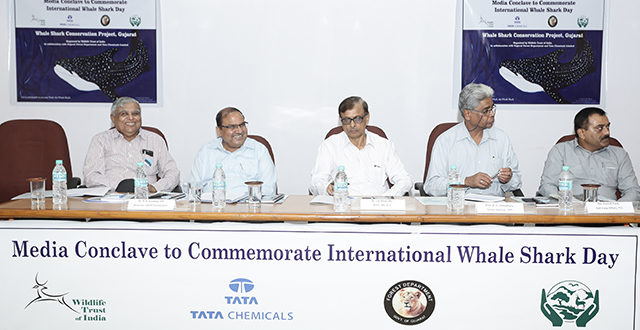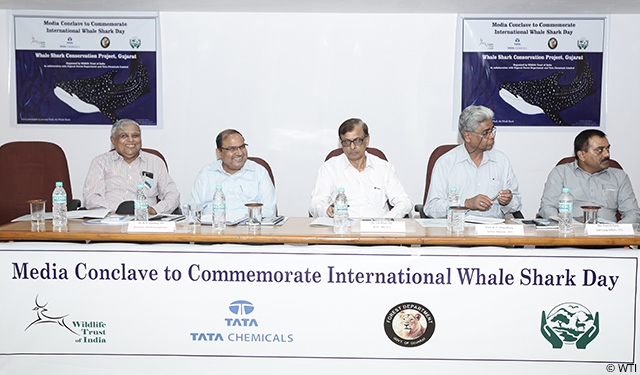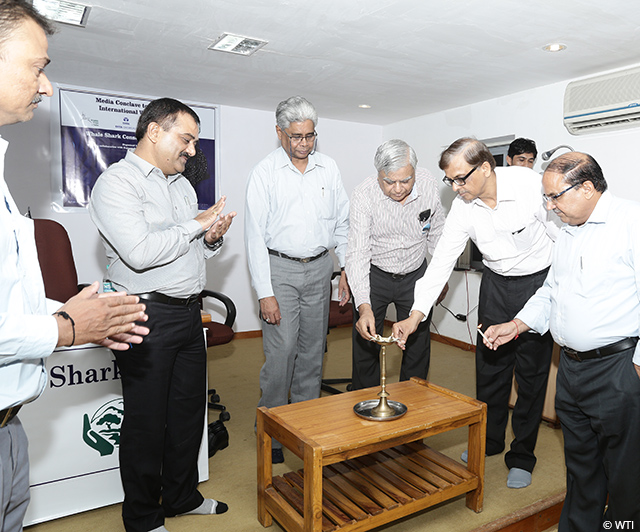Stakeholders of the Whale Shark Conservation Project Host Media Interaction on International Whale Shark Day
Gandhinagar, Gujarat, September 4, 2016: A media conclave was organised at the Gujarat Ecological Education and Research (GEER) Foundation to mark the 8th International Whale Shark Day on August 30. Key stakeholders of the Whale Shark Conservation Project, started in 2004 by Wildlife Trust of India (WTI) in collaboration with Tata Chemicals Ltd (TCL) and the Department of Forests and Wildlife, Government of Gujarat, and run on the ground with the support of marine fishing communities on the Saurashtra coast, interacted with members of the media on the occasion.
International Whale Shark Day, so mandated in 2008 at the 2nd International Whale Shark Conference held in Isla Holbox, Mexico, is a day to celebrate this gentle giant of the sea, the world’s largest fish. Global populations of the whale shark have continued to dwindle and it was recently categorised as ‘Endangered’ on IUCN’s Red List due to negative human impacts both direct and indirect. The Whale Shark Conservation Project – the only project in India focused on the conservation of this species – has provided a glimmer of hope, particularly as a community-led project that has helped the whale shark find a measure of security in a coastal area where it was once brutally hunted.
The conclave at the GEER Foundation, an acknowledgement of the critical role that the media plays in shaping local and national attitudes towards conservation, was presided over by Dr JA Khan, PCCF of Gujarat. Professor VC Soni attended as the Guest of Honour and Dr RD Khamboj, Director, GEER Foundation, Mr Kiran Desai, Sr Programme Director, Centre for Environment Education (CEE), Mr Paresh Tank of TCL and Professor BC Choudhury, Sr Advisor, WTI briefed the gathering on different aspects of the project and whale shark conservation in general.
In his opening remarks, Dr Khan stated that whale sharks were highly regarded in socio-cultural terms throughout their range countries across the globe. Dr Khamboj mentioned the ecological significance of the species and urged everyone to take part in the noble cause of its conservation. Mr Tank briefed the gathering on TCL’s association with WTI through the project and declared that it was a great honour to be a part of a project that aims to conserve such a charismatic species.
A technical session was conducted following the inaugural session. CEE’s Mr Desai underlined the interconnectedness of all life and the role of ordinary citizens in the conservation of nature and natural resources. WTI’s Professor BC Choudhury, while outlining the Whale Shark Conservation Project’s progress, said: “It is a matter of real concern that the number of days marking the conservation of each species is increasing every year. We should strive to achieve a day when no species is threatened and no such events are required for their conservation.”
“The Department of Forests and Wildlife has been compensating fishermen for the loss/damage of their nets up to an amount of Rs 25,000; more than 500 compensations have been paid thus far, amounting to nearly a crore” said Mr Senthil Kumaran, IFS, DCF, Junagadh, while also describing how the project’s photographic self-documentation scheme had led to an improved rate of successful whale shark rescues. Mr Devubhai Hoddar, Head of the Fishermen’s Association, Mangrol expressed his gratitude towards the project team for their constant support: “The fishing community of Gujarat is honoured to be a part of such an important project”, he said. The meeting concluded with closing remarks, acknowledging all the participants, by Sajan John, Head-Marine, WTI.
Launched by WTI in 2004, the Whale Shark Conservation Project has successfully combined a community-led awareness and participation model with ongoing scientific research on the whale shark’s population dynamics, migratory behaviour and habitat preferences. As of July this year, local fishermen have rescued and voluntarily released 601 whale sharks entangled in their nets.











